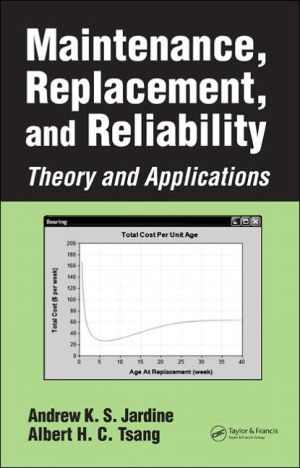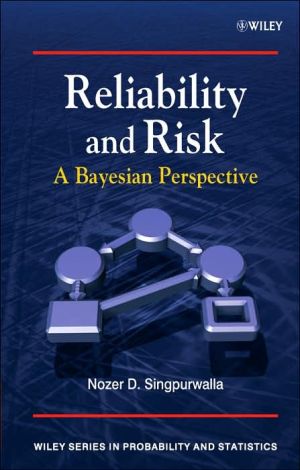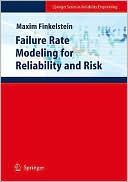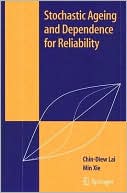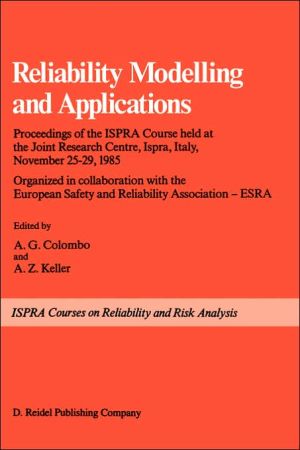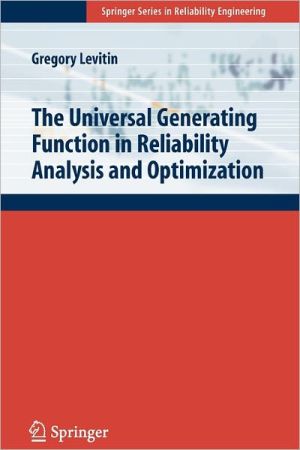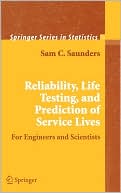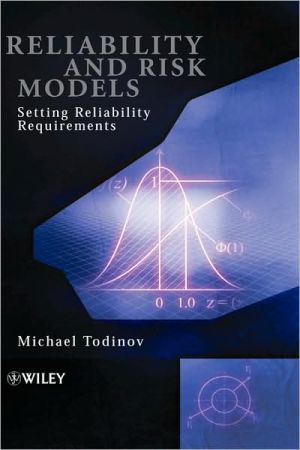Maintenance, Replacement and Y
Based on the results of research in physical asset management, Maintenance, Replacement, and Reliability: Theory and Applications introduces students to the tools for making data-driven decisions and how to use them. The book offers a solid theoretical foundation for these tools, demonstrating applications through various case studies. Firmly rooted in reality, the applications covered relate to areas such as food processing, the military, mining, transportation, steel, and petrochemical and...
Search in google:
Based on the results of research in physical asset management, Maintenance, Replacement, and Reliability: Theory and Applications introduces students to the tools for making data-driven decisions and how to use them. The book offers a solid theoretical foundation for these tools, demonstrating applications through various case studies. Firmly rooted in reality, the applications covered relate to areas such as food processing, the military, mining, transportation, steel, and petrochemical and pharmaceutical industries. Ideal for classroom use, this text features supplementary software that can be downloaded from the CRC Web site. The downloadable educational versions of software packages include: OREST, SMS, EXAKT for CBM optimization, PERDEC, Workshop Simulator, Crew Size Optimizer, and WiebullSoft. This book can be used as a textbook for a one-semester senior undergraduate or postgraduate course on maintenance decision analysis. It provides problem sets with answers at the end of each chapter, an extensive set of PowerPoint slides covering the various chapters and appendices, a solutions manual for the problems in the book, and a bank of more than 100 examination questions. Instructors who adopt the book can obtain these resources at www.crcpress.com. The authors approach the topic with the ideology that mathematical modeling is not a spectator sport. Their examination of the underpinning theories for formulating models and exploration of real-world applications make the book both informative and practical. It provides professors with the tools they need to easily teach their students how to transform data into information.
Introduction From Maintenance Management to Physical Asset Management The Challenges of Physical Asset Management Improving Physical Asset Management Reliability through the Operator: Total Productive Maintenance Reliability by Design: Reliability-Centered Maintenance Optimizing Maintenance and Replacement Decisions The Quantitative Approach References Component Replacement Decisions Introduction Optimal Replacement Times for Equipment Whose Operating Cost Increases with Use Stochastic Preventive Replacement: Some Introductory Comments Optimal Preventive Replacement Interval of Items Subject to Breakdown (Also Known as the Group or Block Policy Optimal Preventive Replacement Age of an Item Subject to Breakdown Optimal Preventive Replacement Age of an Item Subject to Breakdown, Taking Account of the Times Required to Effect Failure and Preventive Replacements Optimal Preventive Replacement Interval or Age of an Item Subject to Breakdown: Minimization of Downtime Group Replacement: Optimal Interval between Group Replacements of Items that Are Subject to Failure: The Lamp Replacement Problem Further Replacement Models Spare Parts Provisioning: Preventive Replacement Spares Spare Parts Provisioning: Insurance Spares Solving the Constant-Interval and Age-Based Models Graphically: Use of Glasser’s Graphs Solving the Constant-Interval and Age-Based Models Using the OREST Software References Problems Inspection Decisions Introduction Optimal Inspection Frequency: Maximization of Profit Optimal Inspection Frequency: Minimization of Downtime Optimal Inspection Interval to Maximize the Availability of Equipment Used in Emergency Conditions, Such as a Protective Device Optimizing Condition-Based Maintenance (CBM) Decisions References Problems Capital Equipment Replacement Decisions Introduction Optimal Replacement Interval for Capital Equipment: Minimization of Total Cost Optimal Replacement Interval for Capital Equipment: Maximization of Discounted Benefits Optimal Replacement Interval for Capital Equipment Whose Planned Utilization Pattern Is Variable: Minimization of Total Cost Optimal Replacement Policy for Capital Equipment Taking into Account Technological Improvement: Finite Planning Horizon Optimal Replacement Policy for Capital Equipment Taking into Account Technological Improvement: Infinite Planning Horizon Software for Economic Life Optimization References Problems Maintenance Resource Requirements Introduction Queuing Theory Preliminaries Optimal Number of Workshop Machines to Meet a Fluctuating Workload Optimal Mix of Two Classes of Similar Equipment (such as Medium/Large Lathes) to Meet a Fluctuating Workload Rightsizing a Fleet of Equipment: An Application Optimal Size of a Maintenance Workforce to Meet a Fluctuating Workload, Taking Account of Subcontracting Opportunities The Lease or Buy Decision References Problem Appendix 1: Statistics Primer Appendix 2: Weibull Analysis Appendix 3: Time Value of Money: Discounted Cash Flow Analysis Appendix 4: List of Applications of Maintenance Decision Optimization Models Appendix 5: Ordinates of the Standard Normal Distribution Appendix 6: Areas in the Tail of the Standard Normal Distribution Appendix 7: Values of Gamma Function Appendix 8: Median Ranks Table Appendix 9: Five Percent Ranks Table Appendix 10: Ninety-Five Percent Ranks Table Appendix 11: Critical Values for the Kolmogorov—Smirnov Statistic (d) Appendix 12: Answers to Problems Index
